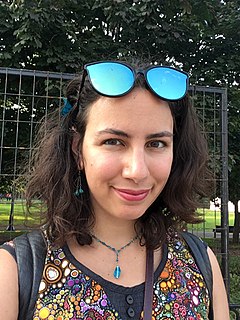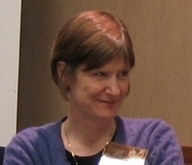A Quote by Amal El-Mohtar
This is a collection of dexterous, loving, beautifully optimistic work that left me breathless and delighted.... Hannu Rajaniemi's magnificent science fiction - as is paradoxically appropriate - is pure magic.
Related Quotes
Being a fan of science fiction, I collect a lot of science fiction art work and so if you go to my house there's like a library and you just geek out on science fiction material. A lot of the colony worlds specifically are built as a melting pot of different societies, because the world is at a point where there are only two zones that are left inhabitable.
Science fiction is a weird category, because it's the only area of fiction I can think of where the story is not of primary importance. Science fiction tends to be more about the science, or the invention of the fantasy world, or the political allegory. When I left science fiction, I said "They're more interested in planets, and I'm interested in people."
There are many other writers whose work I admire tremendously, but none whose work struck me at just the right young age. Jack Vance taught me that speculative fiction, science fiction, could be wonderfully and liberatingly stylistic. It didn't have to be pulp stuff. He really changed my writing and my view of science fiction, so if nothing else, my little homage to him in the novelette I wrote for that anthology is my thank-you to him. He helped me see that any genre can have excellent writing in it.
I would say that most of my books are contemporary realistic fiction... a couple, maybe three, fall into the 'historic fiction' category. Science fiction is not a favorite genre of mine, though I have greatly enjoyed some of the work of Ursula LeGuin. I haven't read much science fiction so I don't know other sci-fi authors.
I do have a collection of mid-century, small-press science fiction and fantasy hardcovers that is my most focused and dedicated collection. Everything else I tend more to acquire or amass than collect. I have vinyl records I listen to all the time when I work. But I don’t collect records. I just buy records where the price seems right and it’s music I actually listen to.
If there is no god, what is left but science? What is left to endow us with any grace? You can tell me the chemical makeup of my skin and my brain, but how can you explain away my soul? And if there is no god to watch over me, chastise me, grieve for me, rejoice for me, make me fear, and make me wonder, what am I but a collection of metals and liquids with nothing to celebrate about my daily living?
Science fiction is fantasy about issues of science. Science fiction is a subset of fantasy. Fantasy predated it by several millennia. The '30s to the '50s were the golden age of science fiction - this was because, to a large degree, it was at this point that technology and science had exposed its potential without revealing the limitations.
It had also been my belief since I started writing fiction that science fiction is never really about the future. When science fiction is old, you can only read it as being pretty much about the moment in which it was written. But it seemed to me that the toolkit that science fiction had given me when I started working had become the toolkit of a kind of literary naturalism that could be applied to an inherently incredible present.



































